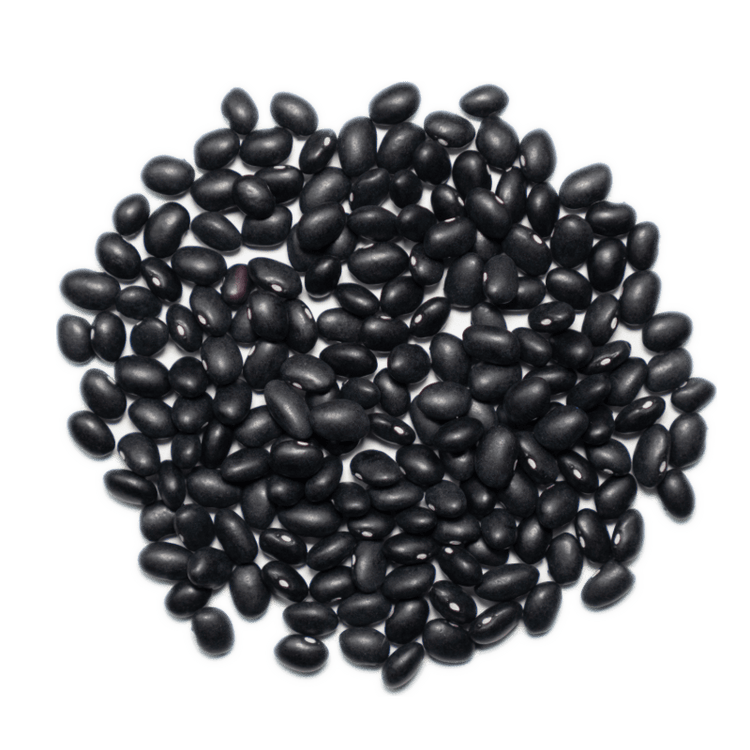Black Beans

What are Black Beans?
Black beans are a type of legume that are commonly used in Latin American cuisine, although they are now popular worldwide. They are also known as turtle beans due to their hard, shell-like appearance. Black beans are small, oval-shaped beans that are black in color with a white center. They have a dense, meaty texture and a slightly sweet, nutty flavor.
Black beans are a great source of plant-based protein and are also rich in fiber, vitamins, and minerals. They contain iron, magnesium, phosphorus, and potassium, as well as folate and other B vitamins. Black beans are also low in fat and calories, making them a healthy and nutritious addition to any diet.
Black beans can be used in a variety of dishes, including soups, stews, salads, and dips. They are often combined with rice to make a classic Latin American dish known as “beans and rice” or “rice and beans.” Black beans can also be mashed and used as a filling for tacos, burritos, and quesadillas. Additionally, they can be added to chili, pasta dishes, and even brownies for a boost of nutrition and flavor.
Overall, black beans are a versatile and healthy ingredient that can be enjoyed in a variety of dishes. Whether you are a vegetarian, vegan, or simply looking to add more plant-based foods to your diet, black beans are an excellent choice.
How to Cook Black Beans?
Black beans are a staple food in many cultures around the world. They are packed with protein, fiber, and other essential nutrients. If you want to learn how to cook black beans, there are a few different methods you can use. In this blog post, we’ll walk you through the steps to cook black beans on the stove, in a pressure cooker, and in a slow cooker.
How to Cook Black Beans on A Stovetop
To cook black beans on the stove, you’ll need the following ingredients:
- 1 pound dried black beans
- 1 onion, chopped
- 2 cloves garlic, minced
- 1 tablespoon olive oil
- 1 teaspoon salt
- 4 cups water
Instructions:
- Rinse the beans in a colander and remove any small stones or debris.
- In a large pot, heat the olive oil over medium-high heat. Add the chopped onion and garlic and sauté for a few minutes until the onion is translucent.
- Add the rinsed beans, salt, and water to the pot. Bring to a boil, then reduce the heat to low and simmer for 1-2 hours, or until the beans are tender.
- Once the beans are cooked, remove the pot from the heat and let the beans cool slightly before serving.
How to Cook Black Beans With a Pressure Cooker
To cook black beans in a pressure cooker, you’ll need the following ingredients:
- 1 pound dried black beans
- 1 onion, chopped
- 2 cloves garlic, minced
- 1 tablespoon olive oil
- 1 teaspoon salt
- 4 cups water
Instructions:
- Rinse the beans in a colander and remove any small stones or debris.
- In a pressure cooker, heat the olive oil over medium-high heat. Add the chopped onion and garlic and sauté for a few minutes until the onion is translucent.
- Add the rinsed beans, salt, and water to the pressure cooker. Close the lid and set the pressure cooker to high pressure for 25-30 minutes.
- Once the cooking time is complete, let the pressure release naturally for 10 minutes, then use the quick release method to release any remaining pressure.
- Once the pressure is released, open the lid and stir the beans before serving.
How to Cook Black Beans with a Slow Cooker
To cook black beans in a slow cooker, you’ll need the following ingredients:
- 1 pound dried black beans
- 1 onion, chopped
- 2 cloves garlic, minced
- 1 tablespoon olive oil
- 1 teaspoon salt
- 4 cups water
Instructions:
- Rinse the beans in a colander and remove any small stones or debris.
- In a large skillet, heat the olive oil over medium-high heat. Add the chopped onion and garlic and sauté for a few minutes until the onion is translucent.
- Add the onion and garlic mixture to the slow cooker, along with the rinsed beans, salt, and water.
- Cover the slow cooker and cook on high for 4-6 hours or on low for 8-10 hours, or until the beans are tender.
- Once the beans are cooked, remove the lid and stir before serving.
Does 1000 Springs Mill Utilize Regenerative Agriculture to Produce Black Beans?
Our black beans are produced using regenerative agriculture practices, which involves a comprehensive approach to farming that prioritizes the restoration and enhancement of soil and surrounding ecosystems.
Regenerative agriculture emphasizes the preservation of biodiversity and soil health through various practices such as crop rotation, cover cropping, composting, and reduced tillage. These techniques enable us to boost soil organic matter, improve soil structure, and encourage the growth of beneficial microorganisms in the soil. As a result, our crops are more resilient and healthier.
Moreover, regenerative agriculture practices help in mitigating climate change by sequestering carbon in the soil, reducing greenhouse gas emissions, and lowering the need for synthetic fertilizers and pesticides.
By choosing our black beans, you are supporting an environmentally responsible and sustainable farming system that values the health of the soil, the crops, and the people who consume them. We take pride in providing high-quality products while also committing ourselves to regenerative agriculture.
In conclusion, black beans are a nutritious and healthy legume that contains essential nutrients and can be used in a variety of recipes. They are an ideal choice for individuals who seek a wholesome diet and want to reduce their exposure to synthetic fertilizers and pesticides.

